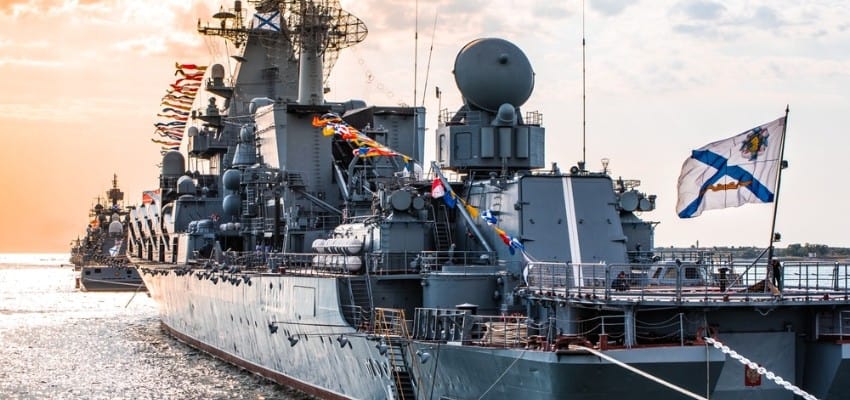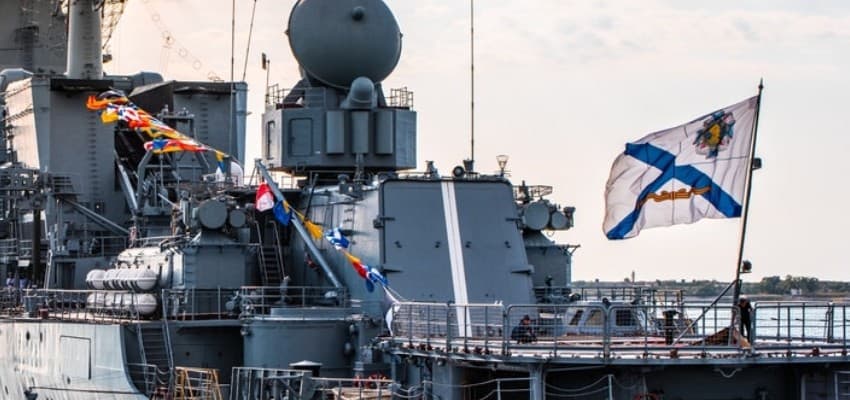|
|
Content Assessment: Flagship No More? Ukraine Conflict Assessments in Maps (April 13 – 15, 2022)
Information - 94%
Insight - 96%
Relevance - 93%
Objectivity - 92%
Authority - 96%
94%
Excellent
A short percentage-based assessment of the qualitative benefit of the post highlighting the recent Ukraine conflict assessments in maps from the Institute for the Study of War.
Editor’s Note: One of the most accurate and detailed sources for ongoing updates on the Ukraine crisis is the Ukraine Conflict Update from the Institute for the Study of War. The Institute for the Study of War (ISW) is a 501(c)(3) organization and produces strictly non-partisan, non-ideological, fact-based research. ISW seeks to promote an informed understanding of war and military affairs through comprehensive, independent, and accessible open-source research and analysis. ISW’s research is made available to the general public, military practitioners, policymakers, and media members. Providing a daily synthesis of key events related to the Russian aggression against Ukraine, ISW updates may benefit cybersecurity, information governance, and legal discovery professionals as they follow the business, information technology, and legal trends and trajectories impacted by and stemming from the current Ukraine conflict.
Assessment and Maps*
Ukraine Conflict Assessments – An Overview in Maps
- Institute for the Study of War (ISW), Russia Team
- Critical Threats Project (CTP), American Enterprise Institute
General Assessment Background Info
- ISW systematically publishes Russian campaign assessments that include maps highlighting the assessed control of terrain in Ukraine and main Russian maneuver axes.
- These maps augment daily synthetic products that cover key events related to renewed Russian aggression against Ukraine.
Russian Offensive Campaign Assessment on April 15, 2022
Extract (Mason Clark and Kateryna Stepanenko)
Russian forces continued small-scale, tactical attacks on the Izyum and Severodonetsk axes; additional reinforcements to date have not enabled any breakthroughs of Ukrainian defenses. Russian forces continue to deploy reinforcements to eastern Ukraine but show no indication of taking an operational pause. The Russian military appears to be carrying out an approach in eastern Ukrainian similar to its failed efforts north of Kyiv in early March—continuing to funnel small groups of forces into unsuccessful attacks against Ukrainian defensive positions without taking the operational pause that is likely necessary to prepare for a more successful offensive campaign. Russian forces continue to grind down Ukrainian defenders in Mariupol, though ISW cannot currently assess how long these forces will hold out and their current supply status.
Key Takeaways
- Russian forces continued to grind down Ukrainian defenses in southwestern and eastern Mariupol, though ISW cannot confirm any major new territorial changes in the past 24 hours. Ukrainian defenders reported that the situation is “deteriorating” and Russian forces are deploying additional artillery and heavy weapons.
- Russian forces continued unsuccessful daily attacks against Rubizhne, Popasna, and Marinka and heavy shelling along the line of contact in eastern Ukraine.
- Ukrainian forces repelled Russian attacks from Izyum toward both Slovyansk and Barvinkove.
Russian Offensive Campaign Assessment on April 14, 2022
Extract (Mason Clark and Kateryna Stepanenko)
The Russian missile cruiser Moskva, flagship of the Black Sea Fleet, sunk on April 14 after a likely Ukrainian anti-ship missile strike on April 13. Ukrainian forces claimed to strike the Moskva with two Neptune anti-ship cruise missiles on April 13.
Ukraine Invasion Update for April 8-14, 2022
Extract (Institute for the Study of War, Russia Team with the Critical Threats Project AEI)
Key Takeaways April 8-14
- Ukraine and Russia are both unlikely to advance ceasefire negotiations until the ongoing Russian campaign in eastern Ukraine develops further. The Kremlin likely seeks to capture at minimum the entirety of Donetsk and Luhansk oblasts, while Kyiv seeks to further degrade the Russian military and potentially conduct major counteroffensives.
- Russian President Vladimir Putin may be purging elements of his intelligence service and blaming close allies for Russian intelligence and planning failures in the lead-up to the Russian invasion of Ukraine.
- The Kremlin is likely falsely blaming Ukrainian forces for planning or conducting provocations in areas where Russian forces intend to commit or have already committed atrocities.
- Independent actors are unlikely to be able to verify Ukraine’s April 11 claim that Russian forces used chemical weapons in Mariupol, but Russian forces retain the capability to use chemical weapons beyond this specific instance.
- The Kremlin is reframing the Russian invasion of Ukraine as a Western war against Russia in a likely effort to maintain Russian domestic acceptance of the war.
- Belarus and Russia are increasing economic ties—and likely Kremlin influence over Belarus—as sanctions cut off both states from international markets.
- Finland and Sweden are increasingly reconsidering their non-aligned status and may move to join NATO in the coming months.
- Western countries continued to search for alternatives to Russian energy while the Kremlin tried to downplay the effects of Western sanctions on its economy and energy sector.
- NATO countries continue to secure their eastern borders and provide military assistance (including several high-end capabilities) to Ukraine to counter Russian aggression.
Ukraine Conflict Maps - 041322-041522
Read the latest Ukraine Conflict updates from the Institute for the Study of War
* Shared with direct express permission from the Institute for the Study of War (ISW).
About the Institute for the Study of War Research Methodology
ISW’s research methodology relies on both primary and secondary sources, enabling researchers to develop a comprehensive understanding of the situation on the ground. In order to analyze military and political developments in any given area, ISW’s research analysts must wholly understand the systems of enemy and friendly forces. They must also understand the population demographics, physical terrain, politics, and history of that area. This lays the analytical foundation for understanding the reasons for particular developments and fulfilling their assigned research objectives. ISW analysts also spend time in places like Iraq, Afghanistan, and elsewhere in order to gain a better understanding of the security and political situation and to evaluate the implementation of current strategies and policies. Our researchers compile data and analyze trends, producing a granular analysis of developments in areas of research, producing an accurate, high-resolution, timely, and thorough picture of the situation. ISW’s research methodology guarantees its success and commitment to improving the nation’s ability to execute military operations, achieve strategic objectives, and respond to emerging problems that may require the use of American military power.
About the Institute for the Study of War
The Institute for the Study of War advances an informed understanding of military affairs through reliable research, trusted analysis, and innovative education. We are committed to improving the nation’s ability to execute military operations and respond to emerging threats in order to achieve U.S. strategic objectives. ISW is a non-partisan, non-profit, public policy research organization. Learn more, get involved, and contribute today.
Additional Reading
- [Annual Update] International Cyber Law in Practice: Interactive Toolkit
- Data Embassies: Sovereignty, Security, and Continuity for Nation-States
Source: ComplexDiscovery























